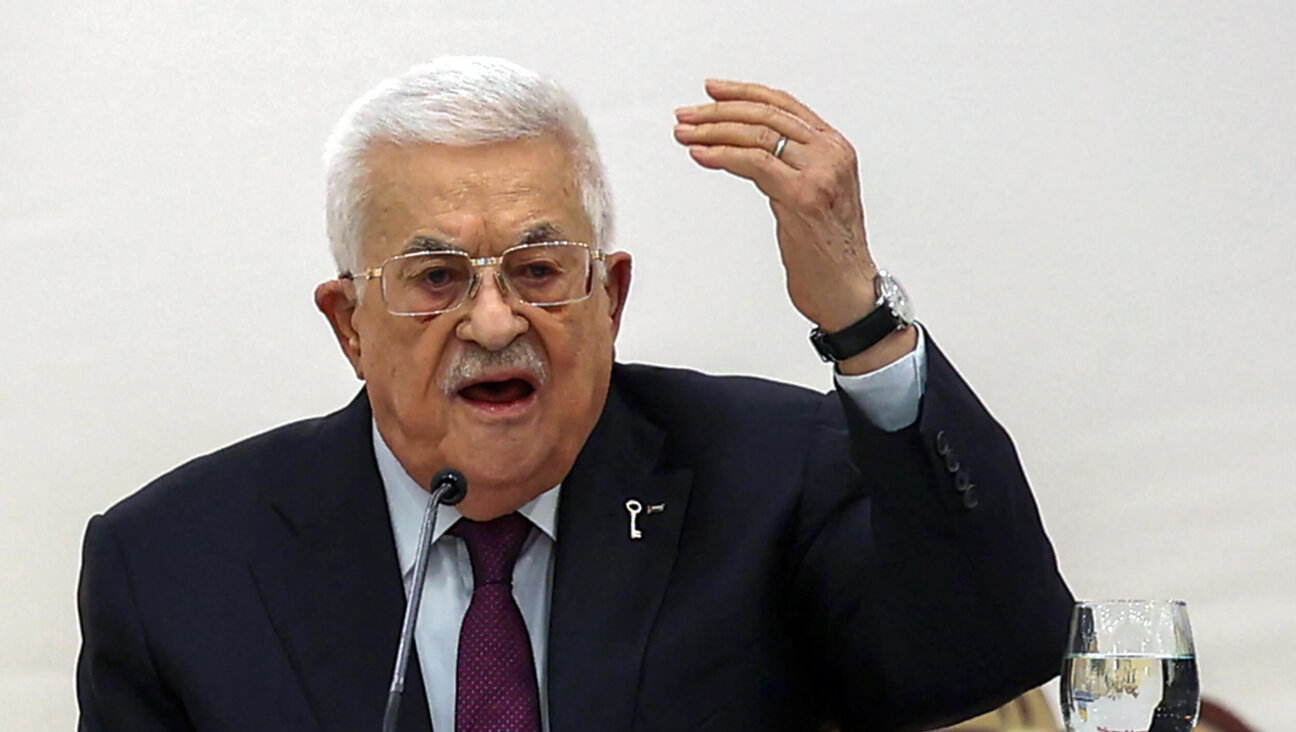The Brain Behind Ahmadinejad

New Lows: A cartoon of an Arab man crucified on a cross marked ?Holocaust? is displayed in a 2006 Holocaust cartoon exhibtion in Tehran. Image by GETTY IMAGES
On December 14, 2005, President Mahmoud Ahmadinejad became the first senior Iranian official to deny the Holocaust. “They have created a myth today that they call the massacre of Jews and they consider it a principle above God, religions and the prophets,” he said in the city of Zahedan.
Until that date, leaders of the Islamic Republic had focused their hostility on Israel and Zionism but had steered clear of Holocaust denial and direct attacks on Judaism. In the decades preceding the 1979 Islamic Revolution, Ayatollah Ruhollah Khomeini did sometimes use antisemitic rhetoric. But after his return to Iran, he declared that Jews should be protected. This position was consistent with the traditional Islamic view of Jews as “people of the book.”
Many answers have been offered to explain Ahmadinejad’s more overtly antagonistic posture. Some believe he wishes to be viewed in the Muslim world as a hero who is not frightened to take on Israel and its supporters on any ideological battlefield. Others believe that he actually wants to increase Iran’s international isolation, because doing so would allow him to crack down hard on the opposition. Still others believe he wants to show up the double standards of the West, where criticism of Islam is allowed under the principle of freedom of speech yet Holocaust denial is taboo and in some countries forbidden under law.
More recently, there have even been suggestions that Ahmadinejad’s Holocaust denial reflects an attempt to overcompensate for what is alleged to be his own Jewish background. This theory is rooted in a ridiculous report that appeared earlier this month in Britain’s Daily Telegraph claiming that Ahmadinejad’s family — citing as evidence its original surname, Sabourjian — was Jewish. In fact, there is no reason to believe that Ahmadinejad is of Jewish ancestry, or even that the surname in question is particularly Jewish.
Instead of these tactical and psychological explanations, perhaps we should look to the realm of philosophy for an explanation of Ahmadinejad’s antisemitic rhetoric.
The Iranian president comes from a cadre of messianic revolutionaries who were influenced by the teachings of an Iranian philosopher by the name of Ahmad Fardid. Born in 1909 in the city of Yazd in central Iran and educated in Europe, Fardid was an admirer of Martin Heidegger, the renowned German philosopher who was a leading intellectual supporter of Hiter’s National Socialist ideology.
After the revolution, Iran’s Islamic radicals were looking for secular philosophies in which to ground their hostility toward the West and their Shiite messianism. In Fardid and his teachings some found what they were looking for.
Fardid believed that ideas such as human rights, tolerance and Western democracy are decadent. He also believed that all international organizations are conspirators against Iran. An antisemite, he saw the “hand of Zionists” controlling foreign governments and nongovernmental organizations. The use of violence to achieve political goals was, in Fardid’s opinion, absolutely permissible.
Fardid offered support for the revolutionaries’ calls for a system of Velayat-e Faqih (or guardianship by Islamic jurist), under which Iran’s “supreme leader” is seen as God’s representative to all Shiites. This concept dovetailed with Fardid’s belief in the importance of a strong leader, or, as Heidegger would have put it, a “Führer.”
This vision of violent, total revolution sweeping away the old Western-aligned order appealed to the messianic instincts of Ahmadinejad and his comrades. Although Fardid died in 1994, his ideology is still very much alive among hardline messianic circles within Iran. According to Mehdi Khalaji, a leading Iran expert at the Washington Institute for Near East Policy, Fardid’s admirers include former heads of Iran’s secret service.
When it comes to Jews, we see two varying approaches among Fardid’s admirers. While Ahmadinejad may have broken new ground by denying the Holocaust, he has not attacked Judaism as a religion. Others, however, do go further. For instance, Mohammad Ali Ramin, Ahmadinejad’s former senior adviser and the organizer of the 2006 Tehran Holocaust denial conference has called Jews “filthy creatures” and blamed them for causing disasters such as SARS and AIDS.
Ahmadinejad’s own antisemitism is of a piece with his larger apocalyptic vision, influenced by Fardid, that has as its culmination the return of the Shiite messiah, the Mahdi. In this vision, the Mahdi’s return would rid the world of all “corrupt” governments and ideologies, such as Zionism. As Ahmadinejad awaits the return of the Mahdi, the rest of the world waits anxiously to see whether Iran will acquire nuclear weapons and how closely Iran’s supreme leader, Ayatollah Ali Khameini, will identify with his president’s messianic visions.
Meir Javedanfar is the co-author, with Yossi Melman, of “The Nuclear Sphinx of Tehran: Mahmoud Ahmadinejad and the State of Iran” (Basic Books, 2007).
The Forward is free to read, but it isn’t free to produce

I hope you appreciated this article. Before you go, I’d like to ask you to please support the Forward.
Now more than ever, American Jews need independent news they can trust, with reporting driven by truth, not ideology. We serve you, not any ideological agenda.
At a time when other newsrooms are closing or cutting back, the Forward has removed its paywall and invested additional resources to report on the ground from Israel and around the U.S. on the impact of the war, rising antisemitism and polarized discourse.
This is a great time to support independent Jewish journalism you rely on. Make a gift today!
— Rachel Fishman Feddersen, Publisher and CEO
Support our mission to tell the Jewish story fully and fairly.
Most Popular
- 1

Opinion The dangerous Nazi legend behind Trump’s ruthless grab for power
- 2

Opinion I first met Netanyahu in 1988. Here’s how he became the most destructive leader in Israel’s history.
- 3

Opinion Yes, the attack on Gov. Shapiro was antisemitic. Here’s what the left should learn from it
- 4

News Who is Alan Garber, the Jewish Harvard president who stood up to Trump over antisemitism?
In Case You Missed It
-

Fast Forward Trump mandates universities to report foreign funding, a demand of pro-Israel groups
-

Fast Forward Exclusive: Trump nominee apologizes for praising Nazi sympathizer while awaiting Senate confirmation hearing
-

Fast Forward Global antisemitism has declined since Oct. 7, Tel Aviv University says
-

Yiddish World VIDEO: Warsaw Ghetto Uprising commemoration highlights women ghetto fighters
-
Shop the Forward Store
100% of profits support our journalism
Republish This Story
Please read before republishing
We’re happy to make this story available to republish for free, unless it originated with JTA, Haaretz or another publication (as indicated on the article) and as long as you follow our guidelines.
You must comply with the following:
- Credit the Forward
- Retain our pixel
- Preserve our canonical link in Google search
- Add a noindex tag in Google search
See our full guidelines for more information, and this guide for detail about canonical URLs.
To republish, copy the HTML by clicking on the yellow button to the right; it includes our tracking pixel, all paragraph styles and hyperlinks, the author byline and credit to the Forward. It does not include images; to avoid copyright violations, you must add them manually, following our guidelines. Please email us at [email protected], subject line “republish,” with any questions or to let us know what stories you’re picking up.















